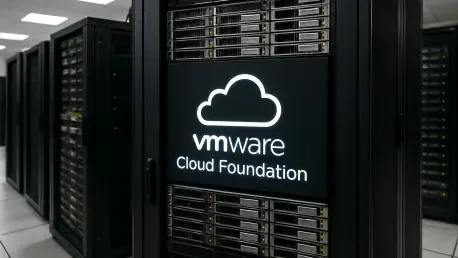Welcome to an insightful conversation with Maryanne Baines, a renowned authority in cloud technology. With her extensive experience evaluating cloud providers, tech stacks, and their applications across various industries, Maryanne offers a unique perspective on the latest advancements in private cloud solutions and AI integration. Today, we dive into the evolving landscape of VMware Cloud Foundation (VCF), exploring its role in modern business strategies, the impact of AI-native features, and the exciting partnerships driving innovation in this space. Our discussion touches on how VCF is reshaping private cloud infrastructure, empowering developers, and enhancing security for enterprises worldwide.
Can you provide an overview of what VMware Cloud Foundation (VCF) is and why it’s become such a critical tool for businesses today?
VCF is a comprehensive platform that integrates compute, storage, networking, and management into a unified private cloud solution. It’s designed to simplify the complexity of managing hybrid cloud environments while providing the scalability and security businesses need. Its importance lies in how it enables companies to modernize their IT infrastructure, streamline operations, and support workloads ranging from traditional apps to cutting-edge AI models. With more enterprises seeking control over their data and costs, VCF offers a robust foundation to build private clouds that balance developer agility with IT oversight.
What trends are you seeing in the adoption of VCF, especially among large enterprises like Fortune 500 companies?
There’s been a significant uptick in VCF adoption among large enterprises, with many Fortune 500 companies leading the charge. These organizations are drawn to VCF because it provides a standardized, scalable platform that can handle massive workloads while integrating seamlessly with existing systems. Over 100 million cores have been licensed globally, which shows the trust and reliance on this solution. Big companies are using VCF to consolidate disparate IT environments, reduce operational silos, and drive faster innovation cycles without sacrificing security or compliance.
How are AI-native capabilities in VCF 9.0 changing the game for businesses compared to earlier versions?
The AI-native designation in VCF 9.0 marks a shift from just supporting AI as an add-on to embedding it directly into the platform’s core. Unlike earlier versions that focused primarily on virtualization and cloud management, VCF 9.0 integrates tools for running and managing AI models with precision at the GPU level. This means businesses can deploy AI workloads natively within their private cloud, ensuring better performance, tighter data control, and enhanced privacy. It’s a transformative step that positions VCF as a go-to solution for companies looking to harness AI without relying heavily on public cloud services.
Can you elaborate on how the Private AI features in VCF 9.0 support data privacy and compliance for enterprises?
Absolutely. The Private AI features in VCF 9.0, like GPU monitoring, model storage, and runtime tools, are built with a strong focus on keeping data within the enterprise’s control. By running AI models on-premises or in a private cloud, companies avoid exposing sensitive information to external environments, which is critical for industries like finance or healthcare with strict regulations. These features also include capabilities for data indexing and vector databases that help maintain compliance by ensuring data is handled securely throughout its lifecycle. It’s about empowering businesses to innovate with AI while staying within legal and ethical boundaries.
What can you tell us about upcoming tools like Intelligent Assist for VCF and how they might benefit IT teams?
Intelligent Assist for VCF is an exciting AI-driven support tool currently in preview. It’s designed to help IT teams diagnose and resolve issues faster by leveraging AI to analyze system performance and suggest solutions. Think of it as a virtual assistant for your cloud infrastructure—whether it’s identifying a bottleneck in resource allocation or troubleshooting a connectivity glitch, this tool can drastically cut down resolution times. For IT teams under pressure to maintain uptime and efficiency, this kind of intelligent support can be a game-changer, freeing them up to focus on strategic initiatives rather than firefighting.
How do partnerships with hardware leaders like NVIDIA and AMD enhance VCF’s capabilities for AI workloads?
These partnerships are pivotal in pushing VCF’s AI capabilities to new heights. With NVIDIA, the integration of cutting-edge hardware like Blackwell GPUs and networking solutions ensures that VCF users can handle intensive AI tasks with unparalleled speed and efficiency. Similarly, collaboration with AMD brings support for Instinct MI350 GPUs and specialized software that aids in fine-tuning large language models and running complex inference tasks. Together, these advancements mean businesses can run diverse AI workloads on different hardware without needing to overhaul their systems, making VCF a versatile and future-proof platform.
What role do developer-focused updates, like the Native vSAN S3 Object Store, play in making VCF more accessible to development teams?
The Native vSAN S3 Object Store is a fantastic addition for developers because it provides an easy way to manage unstructured data directly within VCF. It uses an S3-compatible interface, which means developers can store and retrieve data without needing extra hardware or licenses. This simplifies workflows, especially for teams working on data-intensive applications or AI models that require quick access to large datasets. By reducing friction in data management, VCF empowers developers to focus on building and deploying applications rather than wrestling with infrastructure challenges.
What is your forecast for the future of private cloud platforms like VCF in the context of AI and enterprise needs?
I believe private cloud platforms like VCF will become even more central to enterprise strategies as AI adoption accelerates. The demand for secure, cost-effective, and scalable environments to run AI workloads will only grow, and VCF is well-positioned to meet those needs with its integrated AI services and strong focus on privacy. We’ll likely see deeper integrations with emerging technologies, more automation to simplify management, and broader hardware support to accommodate diverse workloads. Ultimately, platforms like VCF will be the backbone for businesses aiming to balance innovation with control in an increasingly complex digital landscape.









